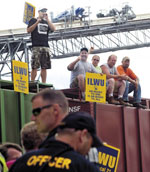
Showdown on West Coast Docks: The Battle of Longview
(November 2011).
click on photo for article
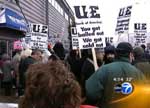
Chicago Plant Occupation Electrifies Labor
(December 2008).
click on photo for article
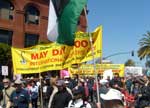
May Day Strike Against the War Shuts Down
U.S. West Coast Ports
(May 2008)
click on photo for article

November 2020
Immigrant Laundromat Workers
Fight Intolerable Conditions
“¡Union, fuerza, solidaridad!”
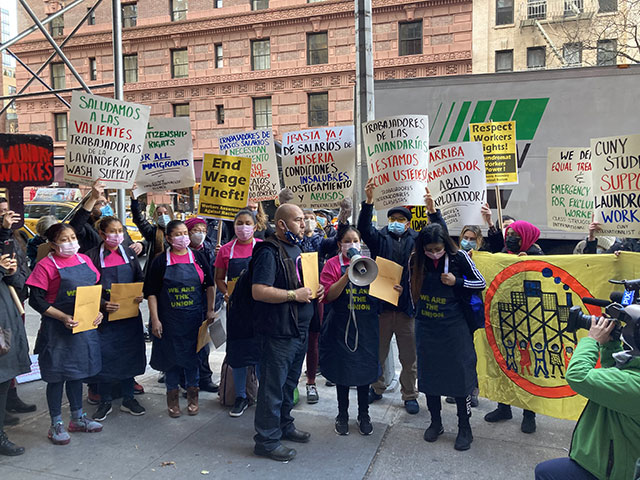
NYC laundromat workers fighting for a union speak out against wage theft and abuse at November 25 protest on Manhattan’s Upper West Side organized by Laundry Workers Center. (Internationalist photo)
On November 25, defenders of labor and immigrant rights rallied to support the workers of the Wash Supply Laundromat on Manhattan’s Upper West Side as they delivered a letter of demands to management. Wearing aprons reading “We Are the Union,” this courageous group of Mexican immigrant women gave voice to the struggle against the intolerable conditions, wage theft and abuse faced by many thousands in laundry sweatshops across the city. It was an inspiring display of workers’ solidarity, a key ingredient to unleashing the collective power of the working class to fight and win. The action, called by the Laundry Workers Center (LWC), began as a march from a nearby park to the laundromat, with upbeat drumming and chants in English and Spanish, including “Laundromat workers, we are with you!” and “¡Arriba trabajador, abajo explotador!” (Up with the workers, down with the exploiters).
Inside the laundromat, each of the workers addressed the boss, refusing to be intimidated as they spoke about the mistreatment and violations of basic labor rights they have experienced. Seeing this collective action and the protest that kept up the chants outside, management kept mum as the workers spoke out one by one, seconded by a delegation of supporters. Their demands include an end to wage theft and discrimination, the right to a break and paid sick leave, better health and safety conditions – including providing PPE needed during the coronavirus pandemic – as well as earning the city’s minimum wage. They are also demanding recognition of the union they are in the process of forming.
The rally also featured the announcement that Beatriz Ramírez, who was fired in April when she sued a Queens laundry for wage theft (she was paid $6.50 an hour for 56-hour workweeks) had won her case, recovering the wages owed her and winning her job back. Rampant wage theft has been a common theme in recent struggles in the New York area highlighted by the LWC and other organizing groups. At Wash Supply, wages vary between four and six dollars less per hour than the NYC minimum of $15, while workweeks reach 60 or more hours with hardly any time to eat during the day (and without overtime pay). Some of those starvation wages are then stolen outright, and when workers question such blatant wage theft, the verbal abuse ramps up again.
Inspiration for Needed Mass Struggle
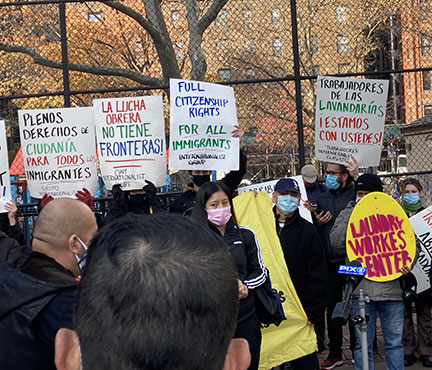 The demand for full
citizenship rights for all immigrants is key to organizing
low-wage workers.
(Internationalist photo)
The demand for full
citizenship rights for all immigrants is key to organizing
low-wage workers.
(Internationalist photo)The laundry industry is one of many sectors in NYC and beyond that run largely on the labor of immigrants who are super-exploited and without many of the legal protections nominally provided for workers. Deemed both expendable and vulnerable, they often do not make even the minimum wage while facing dangerous conditions. As the pandemic has heightened and highlighted this situation, it is especially important to publicize and build support for these workers’ struggles.
Successful organization of low-wage workers in small shops faces many obstacles, compounded by the indifference of official labor “leaders” busy rounding up votes for the Democrats (after all, workers “without papers” are not allowed to vote). These struggles require militant solidarity from – and can be a vital spark to – the multiracial working class facing an all-sided onslaught today. This harks back to mass struggles sparked by immigrant women workers facing deadly conditions in New York sweatshops (the Triangle Shirtwaist fire of 1911) and the mass strikes that gave rise to International Women’s Day. As the current overlapping crises continue to highlight with life-and-death urgency, a massive drive to organize the unorganized, backed on the picket lines by labor sectors that can shut the city down, must be unleashed and carried through to victory.
The current fight of the laundry workers is itself an outgrowth of prior campaigns by immigrant workers in NYC, from greengrocer and deli workers in the late 1990s and early 2000s to the Hot and Crusty bakery/restaurant, B&H Photo, Liberato Restaurant and elsewhere – many of them initiated by the LWC – over the past decade, which the press of the Internationalist Group (IG) and Revolutionary Internationalist Youth (RIY) has covered extensively. In helping build these and other struggles, we have stressed the need to mobilize the power of NYC labor to defend immigrant workers. To unchain that power, the fight must be waged on the basis of workers internationalism and class struggle, with complete independence from any and all politicians and parties of the capitalist class. Out of these campaigns emerged our chant “¡Unión, fuerza, solidaridad!” (Union, power, solidarity) and others that echoed in the streets again in the march to support the Wash Supply workers.
Another – “¡La lucha obrera no tiene fronteras!” (The workers’ struggle has no borders) – found expression on December 8, when some of the Wash Supply spoke to a radio audience in Mexico, through “Frecuencia Obrera Internacionalista,” the weekly radio program of our comrades of the Grupo Internacionalista, which broadcasts from Oaxaca. That same week, stations of the Pacifica radio chain in the U.S., including NYC’s WBAI, broadcast a report and collective interview with the workers.
Callous Disregard for Workers’ Lives
At the November 25 rally, protesters saw some of the dreadful conditions that the laundromat workers are facing. A contingent of IG/RIY supporters, together with comrades of Trabajadores Internacionales Clasistas (Class Struggle International Workers), witnessed the fact that the workplace, located at a basement level, has virtually no ventilation, particularly dangerous in the face of COVID-19. With only one entrance for everyone, it gets hot even during the winter. In the summer, one of the workers said, “it feels like an inferno in there.” Employees have to bring their own face coverings, as the company has not supplied masks, gloves or disinfectants.
Yet as one of the Wash Supply workers recounted in the Pacifica radio interview: “There’s vomit in the clothes, clothes with excrement, with blood and needles. I got stuck with a needle once, and what did a manager tell me? ‘Nothing happened to you.’” No aid is provided for the injuries and illness that often result from such conditions. Meanwhile, alongside the fear of getting COVID-19, even greater is the fear of spreading it to family members.
Sometimes breaking down as they described the demeaning things routinely said to them, these workers face an indifference that is in essence part of the “business plan” of low-wage industries that calculate that workers can be easily replaced. As an Internationalist speaker told the solidarity rally, “for the capitalists, the worker is nothing but raw material for exploitation.” Women workers face a double oppression, and like many other immigrants, many laundry workers must help support family abroad in countries ravaged by U.S. imperialism and capitalist decay, such as Mexico.
The disregard for the laundry workers’ safety was shown yet again when fires broke out – twice – inside the workplace at Wash Supply. Interviewed on the radio, one of the workers explained what happened when something flammable in the clothing led to a fire in a machine.
“The most worrisome thing is that the fire extinguisher was nowhere to be found. We were running around looking for it, and the manager didn’t know where it was either. Finally, one of us dealt with the fire. And it’s such a small enclosed place that the smoke was trapped there. The boss made us clean up, but the smoke lingered. And she forced us to keep working under those conditions.”
During the other fire at Wash Supply, in a chilling echo of the Triangle Shirtwaist fire, the emergency fire exit was blocked.
The situation described by the laundry workers is one more element in the experience of immigrant workers in New York City and elsewhere during the COVID-19 pandemic, that Trabajadores Internacionales Clasistas has documented in the new pamphlet Voces del Epicentro: Inmigrantes en primera línea de la pandemia del coronavirus (“Voices from the Epicenter: Immigrant Workers on the Front Lines in the Coronavirus Pandemic,” available online at http://www.internationalist.org/TIC-Voces-del-epicentro-web-2011.pdf). The calls for “Full citizenship rights for all immigrants!” and for independent class struggle are essential in addressing the role of this vital sector of the working class, from New York’s largely undocumented restaurant, delivery, domestic and laundry workers; to unionized transport, school and hospital workers; to the packinghouse workers of Iowa, Yakima, Washington, and beyond.
Knowing that their workplace is a microcosm of the exploitation and oppression inflicted on so many other workers, one of the laundromat workers at the November 25 rally proclaimed:
“On this day, we want to raise our voices for all those women who work in laundries in the city so that they will know that they are not alone, that there is a fight they can also win, because this fight we begin today is for each and every one of them.”
Victory to the workers of Wash Supply Laundromat! Organize the unorganized! ¡Obreros al poder! ■